Fleurs du Mal Magazine


Or see the index
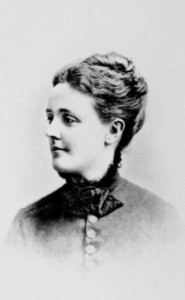
(Theodora) Sarah Orne Jewett
(1849-1909)
Missing
You walked beside me, quick and free;
With lingering touch you grasped my hand;
Your eyes looked laughingly in mine;
And now ? I can not understand.
I long for you, I mourn for you,
Through all the dark and lonely hours.
Heavy the weight the pallmen lift,
And cover silently with flowers.
Sarah Orne Jewett poetry
fleursdumal.nl magazine
More in: Archive I-J, CLASSIC POETRY
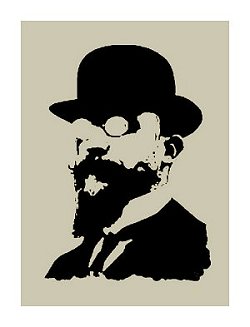
Erik Satie
(1866 – 1925)
Le Carnaval
Les confetti descendent !
Voici un masque mélancolique.
Un pierrot ivre fait le malin.
Arrivent de souples dominos.
On se bouscule pour les voir.
« Sont-elles jolies ? »
3 avril 1914
Erik Satie Le Carnaval
fleursdumal.nl magazine
More in: Archive S-T, Erik Satie, Satie, Erik
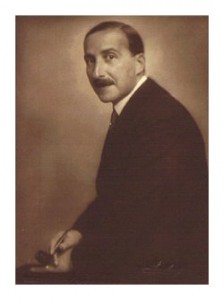
Stefan Zweig
(1881-1942)
Das Mädchen
Heut kann ich keine Ruhe finden …
Das muß die Sommernacht wohl sein.
Durchs off’ne Fenster strömt der Linden
Verträumter Blütenduft herein.
Oh Du mein Herz, wenn er jetzt käme
– Die Mutter ging schon längst zur Ruh –
Und Dich in seine Arme nähme …
Du schwaches Herz, … was tätest du? …
Stefan Zweig poetry
fleursdumal.nl magazine
More in: Archive Y-Z, Stefan Zweig, Zweig, Stefan

Richard Lovelace
(1618-1657)
To Lucasta. The Rose
I.
Sweet serene skye-like flower,
Haste to adorn her bower;
From thy long clowdy bed
Shoot forth thy damaske head.
II.
New-startled blush of Flora!
The griefe of pale Aurora,
Who will contest no more,
Haste, haste, to strowe her floore.
III.
Vermilion ball, that’s given
From lip to lip in Heaven;
Loves couches cover-led,
Haste, haste, to make her bed.
IV.
Dear offspring of pleas’d Venus,
And jollie plumpe Silenus;
Haste, haste, to decke the haire,
Of th’ only sweetly faire.
V.
See! rosie is her bower,
Her floore is all this flower;
Her bed a rosie nest
By a bed of roses prest.
VI.
But early as she dresses,
Why fly you her bright tresses?
Ah! I have found, I feare;
Because her cheekes are neere.
Richard Lovelace poetry
fleursdumal.nl magazine
More in: Archive K-L, CLASSIC POETRY

Voltaire
(1694-1778)
À une dame ou soit-disant telle
Tu commences par me louer,
Tu veux finir par me connaître.
Tu me louras bien moins ; mais il faut t’avouer
Ce que je suis, ce que je voudrais être.
J’aurai vu dans trois ans passer quarante hivers ;
Apollon présidait un jour qui m’a vu naître ;
Au sortir du berceau j’ai bégayé des vers ;
Bientôt ce dieu puissant m’ouvrit son sanctuaire ;
Mon cœur, vaincu par lui, se rangea sous sa loi.
D’autres ont fait des vers par le désir d’en faire ;
Je fus poète malgré moi.
Tous les goûts à la fois sont entrés dans mon âme ;
Tout art a mon hommage, et tout plaisir m’enflamme :
La peinture me charme ; on me voit quelquefois,
Au palais de Philippe, ou dans celui des rois,
Sous les efforts de l’art admirer la nature,
Du brillant Cagliari saisir l’esprit divin,
Et dévorer des yeux la touche noble et sûre
De Raphaël et du Poussin.
De ces appartements qu’anime la peinture
Sur les pas du plaisir je vole à l’opéra.
J’applaudis tout ce qui me touche,
La fertilité de Campra,
La gaité de Mouret, les graces de Destouches :
Pélissier par son art, le Maure par sa voix,
Tour à tour ont mes vœux et suspendent mon choix.
Quelquefois, embrassant la science hardie
Que la curiosité
Honora par vanité
Du nom de philosophie,
Je cours après Newton dans l’abyme des cieux ;
Je veux voir si des nuits la courrière inégale,
Par le pouvoir changeant d’une force centrale,
En gravitant vers nous s’approche de nos yeux,
Et pèse d’autant plus qu’elle est près de ces lieux
Dans les limites d’un ovale.
J’en entends raisonner les plus profonds esprits,
Maupertuis et Clairault, calculante cabale ;
Je les vois qui des cieux franchissent l’intervalle,
Et je vois trop souvent que j’ai très peu compris.
De ces obscurités je passe à la morale ;
Je lis au cœur de l’homme, et souvent j’en rougis ;
J’examine avec soin les informes écrits,
Les monuments épars, et le style énergique
De ce fameux Pascal, ce dévot satirique ;
Je vois ce rare esprit trop prompt à s’enflammer ;
Je combats ses rigueurs extrêmes :
Il enseigne aux humains à se haïr eux-mêmes ;
Je voudrais, malgré lui, leur apprendre à s’aimer.
Ainsi mes jours égaux, que les Muses remplissent,
Sans soins, sans passions, sans préjugés fâcheux,
Commencent avec joie, et vivement finissent
Par des soupers délicieux.
L’amour dans mes plaisirs ne mêle plus ses peines ;
La tardive raison vient de briser mes chaînes :
J’ai quitté prudemment ce dieu qui m’a quitté ;
J’ai passé l’heureux temps fait pour la volupté.
Est-il donc vrai, grands Dieux, il ne faut plus que j’aime ?
La foule des beaux arts, dont je veux tour à tour
Remplir le vide de moi-même,
N’est pas encore assez pour remplacer l’amour.
Voltaire poetry
fleursdumal.nl magazine
More in: Archive U-V, Voltaire

Velimir Chlebnikov
(1885-1922)
Когда умирают кони – дышат…
Когда умирают кони – дышат,
Когда умирают травы – сохнут,
Когда умирают солнца – они гаснут,
Когда умирают люди – поют песни.
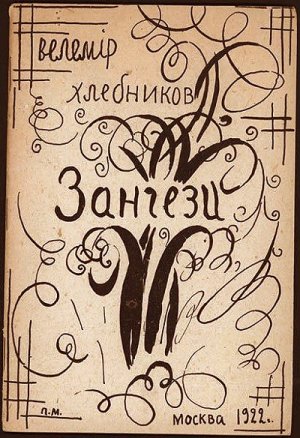
velimir chlebnikov poetry
fleursdumal.nl magazine
More in: Archive C-D, Chlebnikov, Velimir
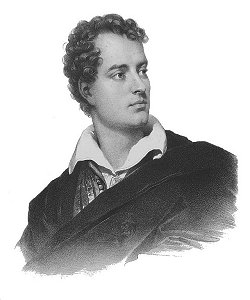
Lord Byron
(1788-1824)
So We’ll Go No More A Roving
So, we’ll go no more a roving
So late into the night,
Though the heart be still as loving,
And the moon be still as bright.
For the sword outwears the sheath,
And the soul wears out the breast,
And the heart must pause to breathe,
And love itself have rest.
Though the night was made for loving,
And the day returns too soon,
Yet we’ll go no more a roving
By the light of the moon.
Lord Byron poetry
fleursdumal.nl magazine
More in: Archive A-B, Byron, Lord
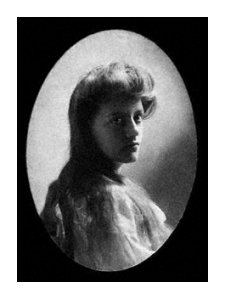
Aline (Murray) Kilmer
(1888-1941)
Things
Sometimes when I am at tea with you
I catch my breath
At a thought that is old as the world is old
And more bitter than death.
It is that the spoon that you just laid down
And the cup that you hold
May be here shining and insolent
When you are still and cold.
Your careless note that I laid away
May leap to my eyes like flame
When the world has almost forgotten your voice
Or the sound of your name.
The golden Virgin da Vinci drew
May smile on over my head,
And daffodils nod in the silver vase
When you are dead.
So let moth and dust corrupt and thieves
Break through and I shall be glad,
Because of the hatred I bear to things
Instead of the love I had.
For life seems only a shuddering breath,
A smothered, desperate cry,
And things have a terrible permanence
When people die.
Aline Kilmer poetry
fleursdumal.nl magazine
More in: Archive M-N, CLASSIC POETRY

Op zondagmiddag 18 januari a.s. is er een poëziemiddag in Libris-boekhandel Van der Meer in Noordwijk.
De optredende 5 dichters hebben allemaal het afgelopen najaar een nieuwe poëziebundel uitgebracht binnen het interessante & gedurfde fonds van Uitgeverij Voetnoot. Op de foto van links naar rechts: Arthur Lava, Andrea Voigt, Willem van Zadelhoff, Freda Kamphuis, Laura Mijnders.
Het wordt ongetwijfeld een inspirerende middag omdat deze 5 dichters de poëzie vanuit alle hoeken en gaten gaan benaderen en belichten. Verwacht contrast, verrassing, passie & humor!
Poëziemiddag in Noordwijk met Arthur Lava, Andrea Voigt, Willem van Zadelhoff, Freda Kamphuis en Laura Mijnders.
Datum: zondagmiddag 18 januari 2015
Tijd: aanvang: 15.00 uur, inloop: 14.30 uur
Entree: € 7,50 (inclusief welkomstdrankje)
Reserveren: 071 – 36 13 073 of info.vandermeer@libris.nl
fleursdumal.nl magazine
More in: - Bookstores, Art & Literature News, Freda Kamphuis, Kamphuis, Freda
The Day is Done
The day is done, and the darkness
Falls from the wings of Night,
As a feather is wafted downward
From an eagle in his flight.
I see the lights of the village
Gleam through the rain and the mist,
And a feeling of sadness comes o’er me
That my soul cannot resist:
A feeling of sadness and longing,
That is not akin to pain,
And resembles sorrow only
As the mist resembles the rain.
Come, read to me some poem,
Some simple and heartfelt lay,
That shall soothe this restless feeling,
And banish the thoughts of day.
Not from the grand old masters,
Not from the bards sublime,
Whose distant footsteps echo
Through the corridors of Time.
For, like strains of martial music,
Their mighty thoughts suggest
Life’s endless toil and endeavor;
And to-night I long for rest.
Read from some humbler poet,
Whose songs gushed from his heart,
As showers from the clouds of summer,
Or tears from the eyelids start;
Who, through long days of labor,
And nights devoid of ease,
Still heard in his soul the music
Of wonderful melodies.
Such songs have power to quiet
The restless pulse of care,
And come like the benediction
That follows after prayer.
Then read from the treasured volume
The poem of thy choice,
And lend to the rhyme of the poet
The beauty of thy voice.
And the night shall be filled with music,
And the cares, that infest the day,
Shall fold their tents, like the Arabs,
And as silently steal away.
Henry Wadsworth Longfellow
More in: Archive K-L, Longfellow, Henry Wadsworth

Ebenezer Jones
(1820-1860)
Remembrance of Feelings
Oh! never may the heart regain
Past feelings, as the mind may thought;
Departed joy leaves dreariest pain,
But memory of its nature!–nought:
Then cease remembrance to reprove;
I shall forget, alas! too soon,
Not that you gave me leave to love,
But what, the heaven, that was that boon.
I shall forget,–nay! World’s alone!
I shall remember, with dark fear,
With self disgust at all that’s known,
With self-despair’s most lying sneer,–
That this life loved you, and that then
Its ramifacations shot through heaven;
And thrilled with measureless rapture, when
Thereby heaven’s bliss to you seemed driven.
I shall remember I was pure;
Fearlessly loving, ever, the whole;
Sure that eternity’s obscure,
All paradised bright stars did roll,
That bearing you, there I might soar,
The joy in your cheek still wildly eyeing,
Its happiness light yet deepening more,
The more my strength rose, heaven defying.
I shall remember each love scene,
From love’s first dawn, to this wild end;
Your deepening clasp, your rapturous mien,
The murmuring sounds your heart did send;–
Take, take his jewels from your brow;
Bend, if your heart be not cold stone;
And I will whisper to you now,
What the forgettings that I moan.
I shall forget what was that heaven,
Through which my loving life did spread;
I shall forget the bliss me given,
When it seemed you through that heaven I led;
I shall forget how feel the pure,
Though remembering their bliss divine;
How pulsed the life yours did immure,
Though remembering that life was mine.
And these forgetting, all beside
In life, will darken deepening gloom;
The world of these deprived, denied,
Will seem to surge, a reeking tomb;
Such darkness may be truth, but when
We loved, how different dreamed this heart;
Might I recall love’s feelings, then
Perchance the dream might not depart.
Then cease remembering to reprove;
I shall forget, alas! too soon,
Not that you gave me leave to love,
But what, the heaven, that was that boon.
Would, lady! that the heart could gain
Past feelings, as the mind may thought;
The hours might then give up their pain,
And be with memoried raptures fraught.
Ebenezer Jones poetry
fleursdumal.nl magazine
More in: Archive I-J, CLASSIC POETRY
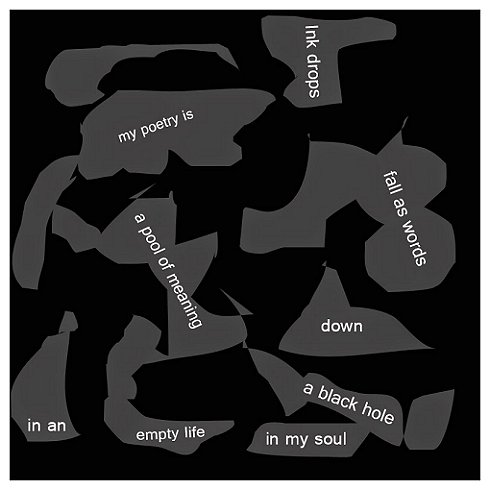
Mathias Jansson: Abstract Word Poem “Ink drops…”
Mathias Jansson is a Swedish art critic and poet. He has contributed with visual poetry to magazines as Lex-ICON, Anatematiskpress, Quarter After #4 and Maintenant 8: A Journal of Contemporary Dada. He has also published a chapbook at this is visual poetry and contributed with erasure poetry to anthologies from Silver Birch Press.
Homepage: http://mathiasjansson72.blogspot.se/ and http://wordshavenoeyes.blogspot.se/
fleursdumal.nl magazine
More in: *Concrete + Visual Poetry F-J, Jansson, Mathias, Mathias Jansson, Mathias Jansson, Visual & Concrete Poetry
Thank you for reading Fleurs du Mal - magazine for art & literature